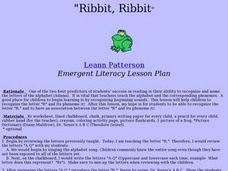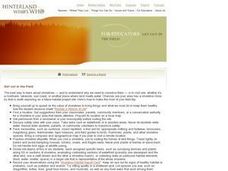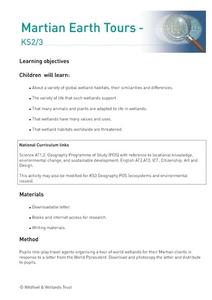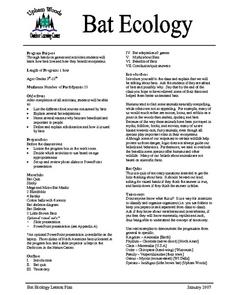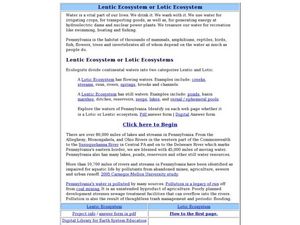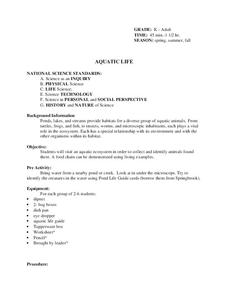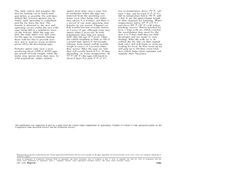Curated OER
Ribbit! Ribbit!
Students research a frog's life cycle and habitat using books, the Internet and lecture. Students make origami frogs, write letters to Toad from Arnold Lobel's "Frog and Toad" and participate in a simulated camouflage activity.
Curated OER
Hunt for Habitats
Students review components of a habitat and go on a hike around a pond and woods exploring different habitats and the plants and animals that use them. They examine mammal pelts and discuss the life histories, adaptations, and positions...
Curated OER
Animal Habitats and Their Management
Students review components present for a quality animal habitat and then explore a goose pond to find out what animals reside there. They learn how wildlife managers work with the land so everything can co-exist together.
Curated OER
Go Fish:
Third graders imagine that they are asked to determine the number of fish in a nearby pond. To count the fish one by one, they could remove the fish from the pond and stack them to one side, or mark each fish so they would not count them...
Curated OER
The Effect of Automobile Exhaust on Hydra in an Environmental Chamber
High schoolers study the structure and habitat of the hydra in this lab lesson. Students determine if the hydra can be used as an indicator to detect pollution from automobile exhaust.
Curated OER
Get Out in the Field
Students visit a shoreline--of an ocean, a lake, a pond, a riverbank, etc., survey it and record what they find there. They map the shoreline and surrounding area and conclude where potential waterfront projects could occur.
Curated OER
Food Chain
Third graders role-play various organisms from a food chain to illustrate how a food chain works. In relay style, 3rd graders fill their cups (stomachs) and, in turn, fill a larger organism's cup (stomach) to visualize the importance of...
Curated OER
Food Chain
Third graders explore why food chains are important. In this food chain lesson plan, 3rd graders break into small groups to represent parts of the food chain. Different amounts of food are given to each group and any spilled food will be...
Curated OER
Go Fish
Help learners discover methods to estimate animal population. They will participate in a simulation of catching and tagging fish in order to estimate the fish population. They scoop and count goldfish crackers, record data, and use...
Curated OER
Big Arky, A Real Arkansas Monster
Middle schoolers examine the world of the Arkansas alligator and topics that are related to wetland environments. They pay attention to the relationship between geography, climate, environment, and the animals who live there. A role-play...
Cornell University
Beneficial Insects
A lot of people think of insects as pests. But actually, some insects are beneficial because they get rid of pests! After learning about beneficial insects, class members research given insects to find out if they are pests or predators.
Curated OER
Peek at the Chesapeake!
Students research organisms that live in the Chesapeake Bay ecosystem. In this science lesson, students choose an organism and research how it is affected by humans. Students create a presentation of their findings.
Curated OER
Parasite Development and Life Cycle
If you are new to teaching agriculture classes, this outline may be helpful when you are preparing a lecture on parasites in livestock. In addition to lecturing on this topic, the lesson plan suggests that learners research the life...
Curated OER
Freshwater Habitats
Middle schoolers take samples from local freshwater sources and examine them for macroinvertebrate life. They take samples from both shallow and deep freshwater environments, measure temperatures, and classify organisms found in their...
Curated OER
Martian Earth Tours
Students study a variety of global wetland habitats, their similarities and differences. They examine the variety of life that such wetlands support and determine that many animals and plants are adapted to life in wetlands, that...
Curated OER
Bat Ecology
Students, through hands on games and activities, discover how bats live and how bats benefit ecosystems. They play a game designed to show them how echolocation works and another to show how mother bats locate their young through their...
Curated OER
Animals Finding Rice Paddies
Fourth graders examine the animals who live in rice paddies and create a chart. In this rice lesson, 4th graders link the types of animals living in each ecosystem with a bar graph. Students use colored bars to show animals that live in...
Curated OER
Lentic Ecosystem or Lotic Ecosystem
Students explore the differences between lentic and lotic ecosystems. In this ecology lesson students study the water systems in Pennsylvania.
Curated OER
Beaver Ecology
Students explore the lives of bgeahvers. They identify the physical and behavioral adaptations that help beavers survive in their environment. Students compare and contrast how beavers influence the ecology of both forest and aquatic...
Curated OER
Data Analysis: bird habitats in rice farms
Fifth graders make a graph and write an essay to interpret the data of birds that take advantage of habitats near rice farms. In this data lesson plan, 5th graders calculate the information given to them and interpret it in an essay form.
Curated OER
Aquatic Life
Students explore aquatic life. In this science lesson, students visit an aquatic ecosystem and collect animals found there. Students create a food chain for the aquatic ecosystem.
Curated OER
Social Studies: Classroom Culture
Sixth graders compose a list of classroom cultural values. They begin with a list of unacceptable behaviors. Each student presents two ideas they think should be part of the class culture. Students try to persuade classmates to accept...
Curated OER
Channel Catfish
Students study the life and biology of the Channel Catfish. In this aquatic biology lesson, students will examine the external and internal features of the catfish along with their breeding habits and environment. This lesson includes...
Curated OER
Frogs: Fact or Folklore
Students discover how frogs are adapted to their environment. They view and discuss a Discovery Channel video on frogs and the myths surrounding frogs. In small, groups they compile data on frogs from the internet to create a Frog Fact...
Other popular searches
- Pond Habitat Diorama
- Pond Habitat Kindergarten
- Pond Habitat Color Sheet
- Pond Habitat for Frogs
- Pond Habitat Food Chain
- Pond Habitat Assessments
- Pond Habitat Diarama
- Pond Habitats
- California Pond Habitats
- Pr Test on Pond Habitats


